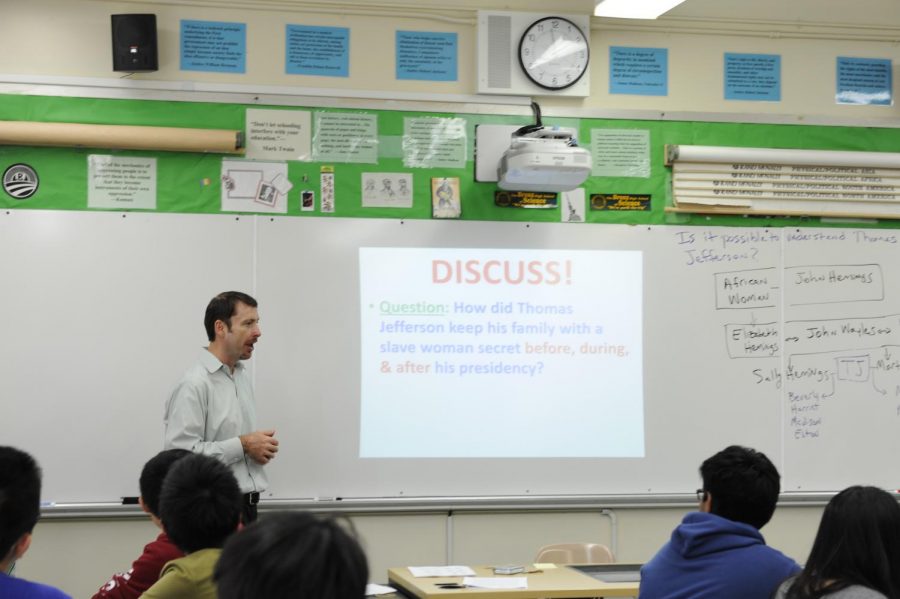Columbus Day is Imperfect, But Now What?
Dr. Davis teaches his Advanced Placement U.S History class.
After Columbus Day recently passed, its history and what it stands for was brought into question. In our increasingly politically-correct world, there has been a growing opposition on this topic. Not everyone believes Columbus is a hero, or even close to one.
To understand the reason for the opposition, it is important to also understand the holiday’s history. In 1492, Christopher Columbus, was sent by Spain to make a trip for trading purposes. Believing the world was round but not accounting for the existence of multiple continents, he ended up in the Americas. His trip marked the first of many, and started the Columbian Exchange where goods, ideas, diseases, and people went back and forth across the Atlantic.
This movement in history resulted in 90% of Native Americans being killed through massacres, disease, and murders, with death tolls and tactics terrible enough to classify their fate as a genocide. Not only did millions of Native Americans die, but the Columbian Exchange also involved the exploitation of slaves from Africa, which would become dark part of our country’s history and leave lasting impacts still felt today. Yet despite all of this, Americans have not stopped honoring this day as a seminal event in U.S. history.
“The inhumane way that Christopher Columbus treated natives is shadowed by the holiday, which is why he should not be as recognized as he is today,” said Anthony Bonavita ’20.
The Columbus Day celebration has deep roots; it was first introduced as a national holiday in 1937 by the Roosevelt administration, prompted by the many Italians who had immigrated to the U.S. at the time. Italians in the early twentieth century were discriminated against and wanted to show everyone that a ‘hero’ to many Americans was actually an Italian.
However, after eighty-one years, a lot has changed. This became evident when interviewing a student who is very in touch with his Italian heritage. “The inhumane way that Christopher Columbus treated natives is shadowed by the holiday, which is why he should not be as recognized as he is today,” said Anthony Bonavita ’20.
This opinion is shared by many who believe that instead of glorifying a man who essentially symbolizes the mistreatment of Native Americans throughout history, respect should instead be paid to those who were persecuted. This sentiment has fueled fifty-two cities in America to change the name of this holiday to “Indigenous Peoples’ Day.” It would be expected that New York City, which is not only one of the most liberal but also most diverse places, would logically follow, but this has not yet occurred.
Dr. Todd Davis, an Advanced Placement U.S History teacher, agrees that Columbus Day unrightfully glorifies Columbus, but also explains why the reimagined version of the holiday is not perfect. “We used to have days of fasting, humiliation, and prayer, but I don’t see a place for that kind of holiday anymore,” said Dr. Davis.
In the current state of American culture, most of our holidays are about celebration. Those that are not have become marketed as such. For example, Veterans Day is supposed to be a day of remembering those who have risked and lost their lives for this country, but it is then marketed as a commercial holiday in which there are hundreds of commercial sales. Respect for our troops has become nothing more than a marketing ploy. Indigenous Peoples’ Day could have a similar fate, one that is created with good intentions in mind but once put into place, could sell out.
The movement towards Indigenous Peoples’ Day may not be a perfect one, but it signifies the shift towards historical recognition of cultures, in a world trying to be more accepting. There are obvious bumps in the road, but in order to progress, it is necessary to look back at our history, and to acknowledge and learn from our mistakes. With Columbus Day, the time has come to do just that.
Ula Pranevicius is an Editor-in-Chief for ‘The Observatory’ as well as a Senior Staff Reporter for ‘The Science Survey.’ Ula enjoys interviewing...
Tina Ou is a staff reporter for ‘The Science Survey’ and the Copy Chief Editor for ‘The Observatory.’ Journalism is intriguing to Tina because...

